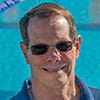Open Water or Pool Swimming? Both is Better.
Embrace the relationship between open water and pool swimming
Triathletes and other open water competitors savor the summertime, looking forward to escaping chlorine by churning through waves under bright blue skies. They believe the scenery, the freedom, and the wonder of water without walls offer a fantastic way to spend time outdoors.
There are also those who prefer the familiar comfort of lane lines, pace clocks, and stripes on the bottom. They enjoy diving off starting blocks, doing turns, counting laps, and sharing lanes with friends.
Which group has the best approach? Well, the truth is that they both do. Let’s discuss why participating in open water and pool workouts makes you a better swimmer.
Improvement Indoors
In most locations, the opportunities for open water practice and competition are seasonal. This tempts many athletes to think that they only need to train during the few months immediately before their target races. This is a huge mistake.
- Swimming is a highly technical sport where small improvements in form result in huge improvements in performance. It can take years of effort and coaching feedback to develop an efficient stroke.
- The motions you make as a swimmer are not duplicated by any other activity. Sure, you can emulate some swimming movements with specific machines or surgical tubing, etc., but those exercises only work large muscle groups. They do nothing for your feel for the water. A mere few weeks of nonimmersion wreaks havoc on your ability to sense and execute the correct hand position and stroke motions.
- Pacing in open water requires a deep understanding of energy allocation over a distance. Using a pace clock in a pool can help you fine-tune your sense of pace, including your knowledge of personal warm-up requirements, sustainable effort levels, and finishing sprint speed.
- Clear water and the proximity of the deck allows your coach to observe and correct technical flaws that would go unnoticed in an open water swim.
- Because above-water navigation (sighting) isn’t required, pool swimming enables uninterrupted focus on the most efficient body-position and breathing habits. These habits serve to keep you streamlined between sighting motions when you take it outside.
Think of your time in the pool as an investment in your open water season. Even if you’re one of the lucky folks who can swim in the ocean (or lake) year round, you should regularly train with a coached Masters program in a pool to keep your skills sharp.
Optimizing the Outdoors
As great as pool workouts can be, there is no substitute for experience in the open water if you intend to race there. You need to practice dealing with the sun, the temperatures, native flora and fauna, and feeding yourself during the swim. If you race in a wetsuit, practice wearing it to find out what it does to your body position and where you need extra lubrication. Get used to running up ramps and beaches and dealing with competitors’ body parts invading your personal space. But even if you never intend to race in open water, there are plenty of good reasons to train there.
- Dealing with temperature variations, seaweed, and the possibility of finding Nemo prepare you for dealing with unexpected occurrences at swim meets, etc. Experienced open water swimmers laugh at minor annoyances such as goggles filling with water, unfamiliar gutter systems, and a pool that might be 79 degrees instead of 81.
- Open water is a great place to practice racing skills, such as burst speed to pass a competitor. One excellent drill is to take turns leading a line of drafting swimmers, alternating after each leader has taken 100 strokes. Without walls to interrupt your flow, you can develop discipline in maintaining a strong stroke cadence at a high level of effort.
- Choppy water is a great teacher of control in breathing, recovery, and efficient entry. When you’re being splashed, smacked, and battered by active water, you develop a sharply-focused awareness on the precision of what your head and hands are doing. Carrying this awareness back to the pool makes you a more efficient swimmer in all strokes.
- Without lane lines to constrain you, any stroke imbalances you have will assert themselves. You’ll tend to veer to one direction or the other, which indicates a condition that needs to be fixed. (Wearing a GPS and mapping your course is a great way to reveal drift, but you can also just observe your tendencies to fade away from the pack.) If it’s not simply poor navigation, it may be crossover, reaching to the side for your breath, or even a lateral strength differential. If it happens in the open, it’s slowing you down in the pool, too, so it needs to be fixed.
Whatever your preferences, you’ll improve your skills by committing to swimming in multiple environments and paying attention to how the skills required in one discipline can benefit your abilities in the other. Plus, you’ll have fun, make new friends, and possibly discover new passions!
Categories:
- Technique and Training
SIGN UP FOR UPDATES FROM USMS

















